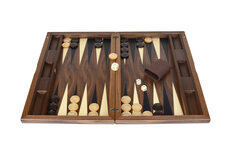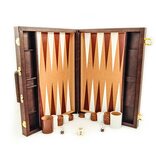The Rules of Tabula
Tabula was a game played by the Romans and is an ancestor of Backgammon. It developed from the Egyptian "Game of 30 Squares". The rules are not completely known and the following is partly deduction and part conjecture.
See also: Backgammon Sets, Boards & Accessories.
Equipment
A tabula board consisted of twenty four rectangles aligned in two opposing rows of twelve. In fact, the same form as a modern Backgammon board - but instead of points, lines divide up the board into twelve sections on either side. Each person has fifteen pieces of contrasting hue. Moves are indicated by three six-sided dice.
The Play
Pieces are entered on the board to the player's near left and travel around the board in an anti-clockwise direction. Players take turns to roll the dice and move the pieces accordingly. Each throw of the three dice gives three corresponding moves. The player can choose to move one piece three times, three pieces once each or one piece twice and another piece once. A player must use as much of the dice throw as possible. Any part of the throw that cannot be moved is abandoned. If a player has two men on the same point, it is safe from attack and an opposing piece cannot move onto that point. If a single piece occupies a point and a piece from the opposing player lands upon the same point, the single piece is captured, removed from the board and must restart its journey. Pieces can be borne off the board only once all that player's pieces are in the final quarter of the board. If pieces have started to be borne off the board and then one is captured, bearing off can only continue once that piece has moved back into the final quarter. A piece on the final point of the circuit can only be borne off with a move of 1, off the penultimate point with a throw of 2 and so on up to 6. The first player to bear off all pieces wins.
These rules are provided by Masters Traditional Games, an Internet shop selling quality traditional games, pub games and unusual games. For general information or for copying and copyright, see our Rules Information page.
Our rules are comprehensive instructions for friendly play. If in doubt, always abide by locally-played or house rules.
Copyright James Masters, 2025. All rights reserved.








































